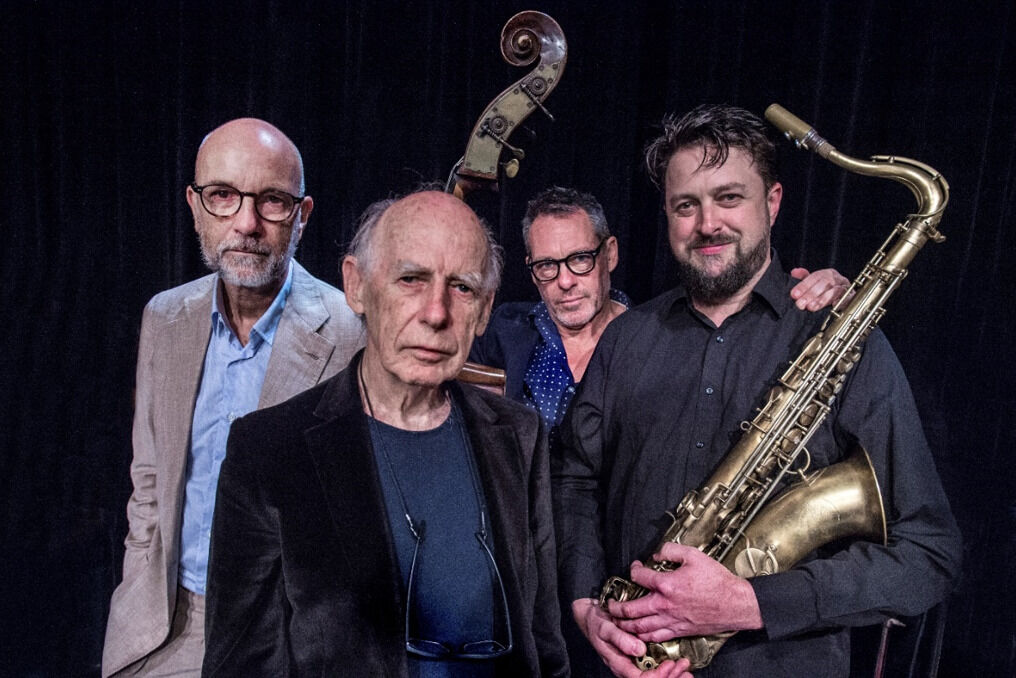No products in the cart.
Healing
This World (Sydney Improvised Music Association)
Pianist Mike Nock, bassist Jonathan Zwartz, tenor saxophonist Julien Wilson and drummer Hamish Stuart recently named their quartet This World, the title of their celebrated debut album released in November 2019. This makes sense, as the group’s music, as much as that of any comparable quartet in Australia of which I’m aware, tends to epitomize contemporary jazz. Unlike many modern jazz groups on the scene, their music is not merely a celebration of a past genre, but is very much in the now.
This World (L-R, Hamish Stuart, Mike Nock, Jonathan Zwartz, Julien Wilson). Photo © Anthony Browell.
But why is the music of This World so difficult to categorise? What makes their music so distinctive? Perhaps it’s because it’s genuinely eclectic, emanating from four distinct sources. Each member composes and there’s a democratic spirit in the air. No one composer appears to have priority, and it’s certainly difficult to determine which of the four is superior to the others. They each have their own bag, creating a repertoire of diversity and contrast.
This concert at Foundry 616 was a tour de force. It commenced with Mike Nock’s composition ‘Deception’, the first track on their new album Another Dance. Characteristic elements in the group’s music were immediately apparent. Firstly, the piece began with an introduction by Nock, thereby giving listeners a taste of what has become virtually a genre in itself in today’s jazz: solo piano. Secondly, once into tempo, Hamish Stuart’s choice of brushes was interesting considering that on the album he used sticks. Was this because he was sensitive to the dynamics of a live performance in a particular venue?
Thirdly, when Julien Wilson joined in, the big sound of his tenor saxophone filled the room. Has any major tenorist in Australian jazz ever had a fuller, warmer sound than Wilson? Or, indeed a more mellifluous style as an improviser? Moreover, his capacity to vary his sound quality – notes which are distorted in a very hip way, or soft, tentative notes in his higher register – suggests a deepseated knowledge of the variety of sounds one finds in the tenor tradition.
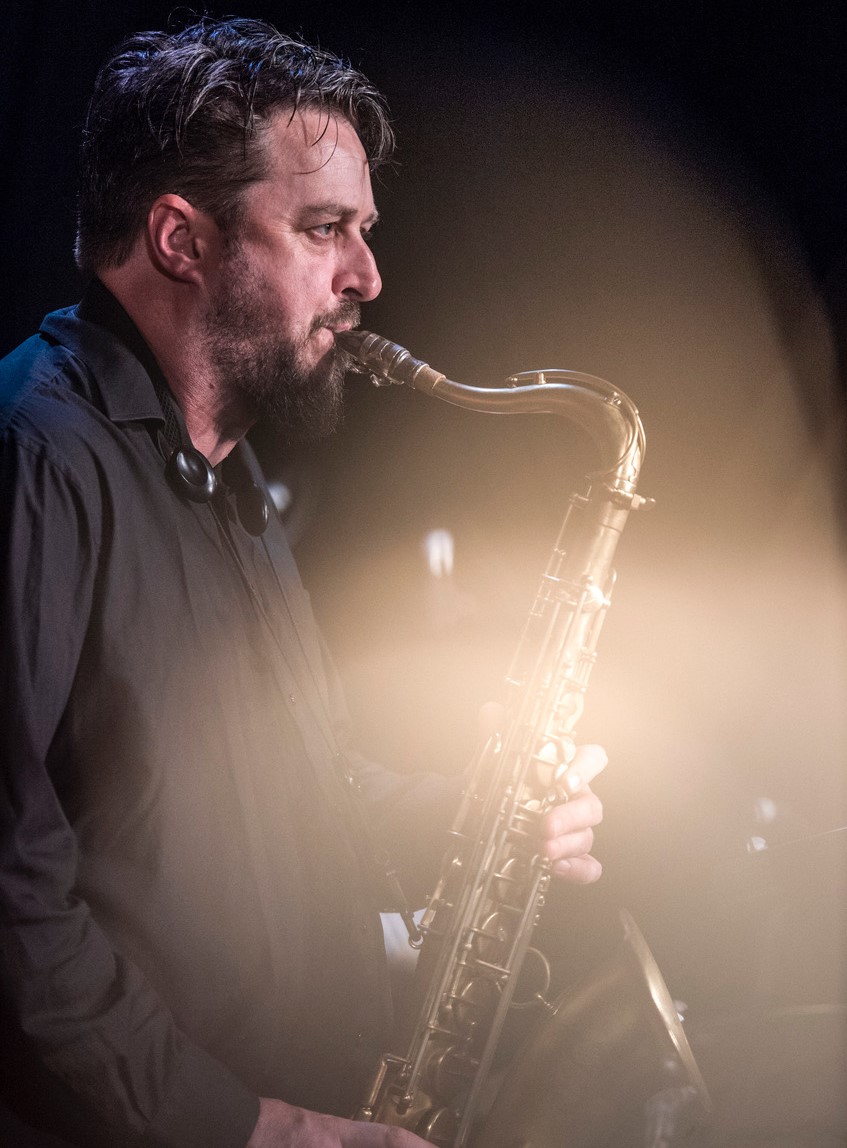
Julien Wilson. Photo © Anthony Browell.
The playing of Stuart deserves acknowledgment. His contributions are crucial to the quality of This World’s music. In a jazz community where some local drummers can be intrusive, having adopted the conversational approach which has evolved over many years, it’s immensely heartwarming to hear a drummer who is prepared not only to use brushes but also to stay with them, resisting the temptation to pick up the sticks and explode onto the ride cymbal.
This is not to say that Stuart isn’t an important part of the conversations within the group’s music – absolutely he is – but he can simultaneously be a gentle drummer playing at such a volume that his contributions can be clearly heard while, at the same time, providing ample space in the sound to enable the solos of others to be heard clearly.
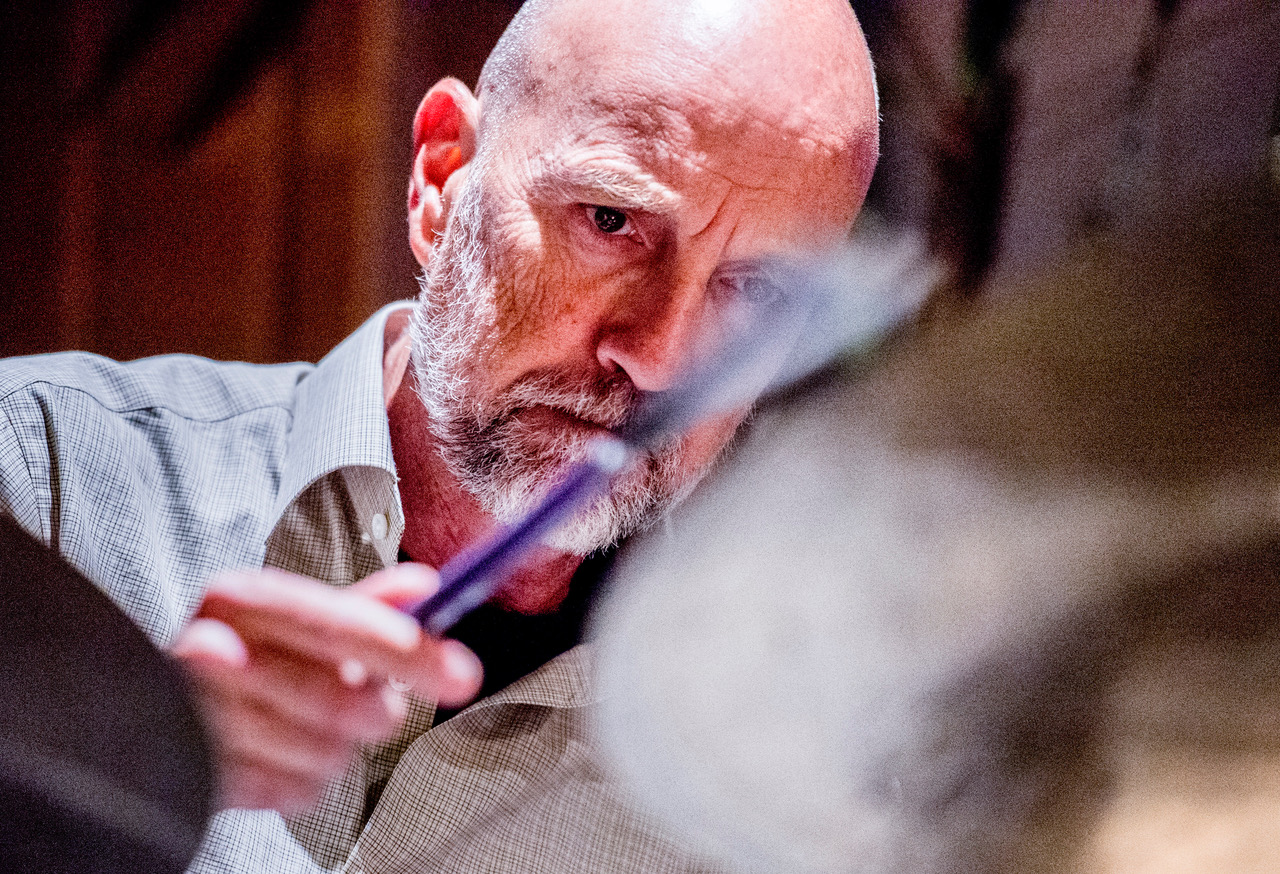
This World’s drummer, Hamish Stuart. Photo © Anthony Browell.
After ‘Deception’, three other tunes from Another Dance completed the first set: ‘LDT’ (Wilson),’Headlands’ (Stuart) and ‘Winter’ (Zwartz). Stuart used brushes throughout the whole set, other than momentarily in the case of ‘Winter’, when he began with brushes, then picked up his sticks and, throughout Wilson’s tenor solo, gently played on the ride cymbal, before a sudden burst of high energy to support Wilson’s climactic solo. This was a highly arresting moment, before he returned to brushes for re-statement of the theme.
In Stuart’s composition ‘Headlands’ he introduced an unusual percussion instrument, the ocean drum. This is a circular, double-sided drum which apparently is filled with small metal beads which, when moved around, produces a relaxing, mellow sound of waves. Once again, the temperature of the music was brought down with an introduction by Nock, accompanied by ocean drum, in an improvisation which Nock says is related to Stuart’s written theme, later played in unison by the melodic instruments. Stuart, described by Jonathan Zwartz as the group’s “secret weapon composer”, has created a typically distinctive piece which differs substantially to the works of the others.
Zwartz’s piece ‘Winter’, which closed the set, once again included an unaccompanied introduction, this time by the composer on double bass. This was also a departure from the album, where no bass introduction exists. As before, this solo introduction served to provide stillness in the music, as well as to demonstrate the virtuosity of the soloist, in this case Zwartz himself.
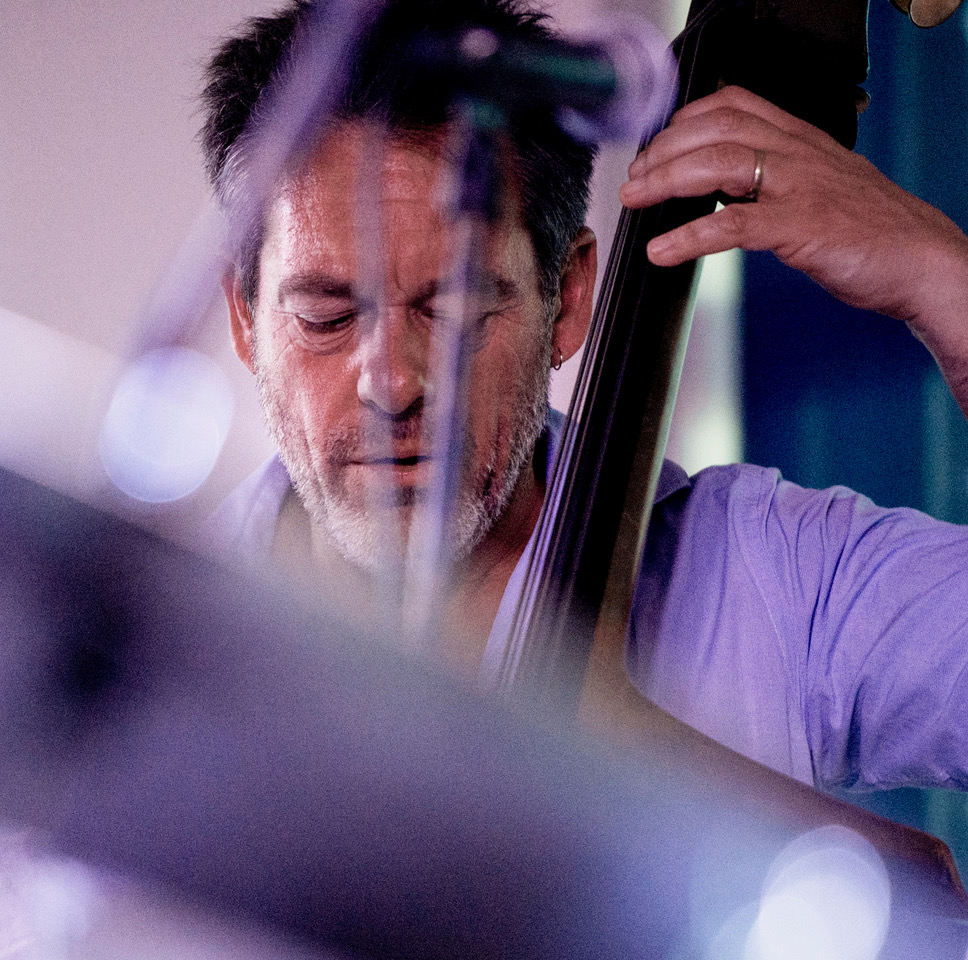
This World bassist Jonathan Zwartz. Photo © Anthony Browell.
Similar approaches were taken in the second set, opened by Nock’s spirited piece from the This World album ‘Old’s Cool’. This swinging piece in four was a reminder of the importance of the immortal swing-feel and how much it deserves to survive in jazz today, where too often it is neglected or marginalised.
To introduce the second piece, ‘And in the Night Comes Rain’, Zwartz read the Bertold Brecht poem Half in my Sleep, apparently the inspiration for his composition. Nock provided the lovely, unaccompanied piano introduction, which was a memorable highlight of the album. Is it my imagination, or is it the case that the stillness inherent in Zwartz’s compositions engenders a particularly moving lyricism in Nock’s playing?
In most jazz performances at this level, there comes a time when the musicians, now warmed up, go into overdrive. Here it came with a vengeance in Wilson’s down-home composition ‘Riverside’, apparently inspired by a church service in Harlem. This great composition, in 3/4, produced music drenched in gospel and the blues. By this time the musicians were flying, and into unbridled expression, producing inspirational solos.
The final tune, Zwartz’s beautiful title track from This World – a soft, grave, thoughtful, hymn-like work – cast such a hypnotic spell in the venue, that when it concluded – as was the case in February, 2020, when I last heard this band – the audience was reluctant to applaud, to disturb the exquisite mood created by the music.
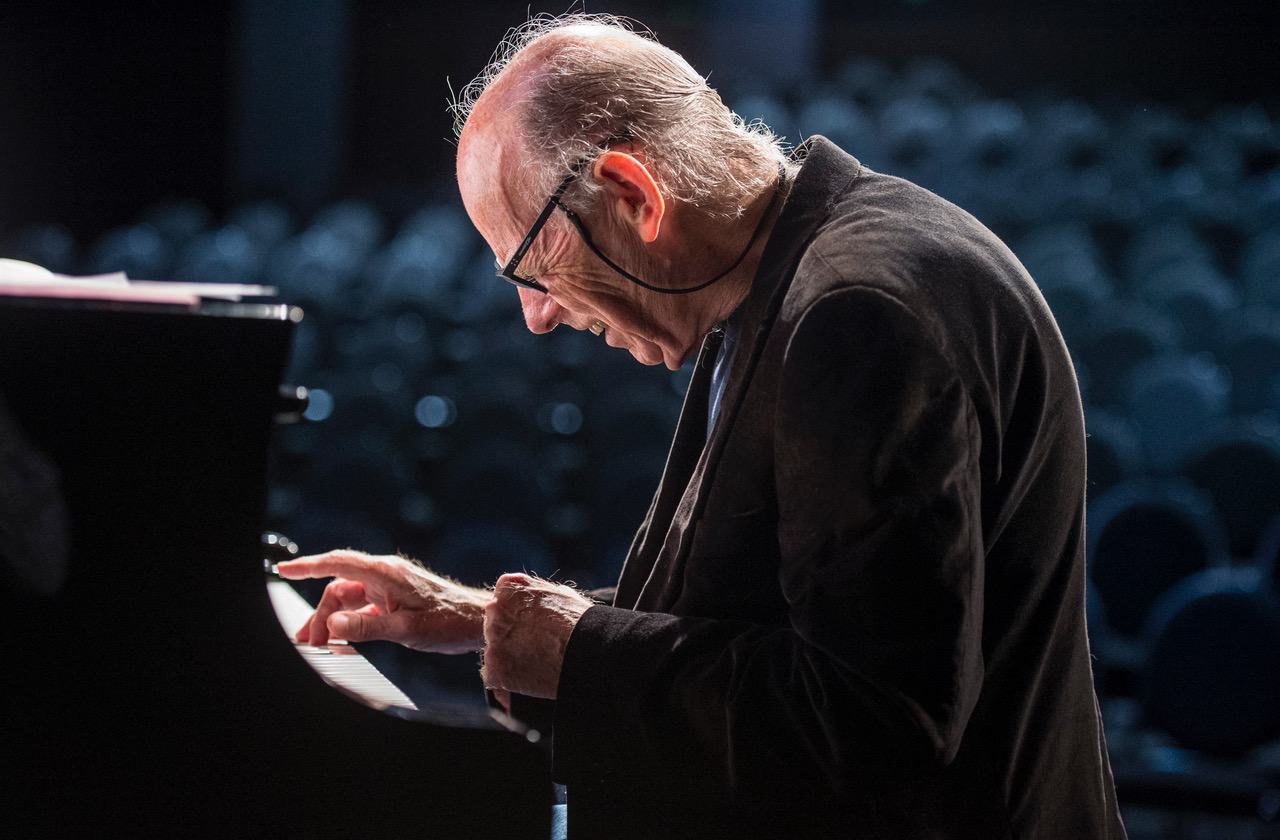
Pianist Mike Nock performing with This World, April 2022. Photo © Anthony Browell.
Still, a standing ovation soon erupted, and an encore was a must. The response came in the form of Mike Nock’s composition ‘The Dream’, and the evening ended on a note of considerable triumph.
I was left with the feeling that, compared to this brilliant quartet, which is at the same time both powerful and meditative, some other comparable modern jazz groups on the scene are starting to sound rather conservative. Correct me if I’m wrong.


